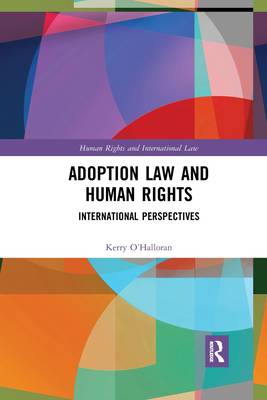
- Retrait gratuit dans votre magasin Club
- 7.000.000 titres dans notre catalogue
- Payer en toute sécurité
- Toujours un magasin près de chez vous
- Retrait gratuit dans votre magasin Club
- 7.000.0000 titres dans notre catalogue
- Payer en toute sécurité
- Toujours un magasin près de chez vous
Description
In recent decades, there have been many changes to adoption law and practice, such as a sharp decline in the voluntary relinquishment of children, an increase in the number consigned to public care, and an abrupt decrease in those made available on an intercountry basis. Additionally, human rights are becoming more prominent, particularly in relation to issues such as: non-consensual adoption; the ethics of intercountry adoption; the eligibility of LGBT adopters; the impact of commercial surrogacy; and the sometimes conflicting rights of birth parents and adoptees when accessing agency birth records.
In this book, O'Halloran presents a comparative analysis of the interaction between adoption law and human rights in common law (England and the US), civil law (France and Germany), and Asiatic traditions (Japan and China), while also developing a matrix of legal functions to assist in identifying and analysing areas of tension between human rights and adoption.
This book is intended for a lawyer readership, whether professional, student or academic: researchers and postgraduate students in subjects such as social work, social policy and politics may also find it helpful.
Spécifications
Parties prenantes
- Auteur(s) :
- Editeur:
Contenu
- Nombre de pages :
- 364
- Langue:
- Anglais
- Collection :
Caractéristiques
- EAN:
- 9780367893651
- Date de parution :
- 11-11-19
- Format:
- Livre broché
- Format numérique:
- Trade paperback (VS)
- Dimensions :
- 156 mm x 234 mm
- Poids :
- 508 g

Les avis
Nous publions uniquement les avis qui respectent les conditions requises. Consultez nos conditions pour les avis.






